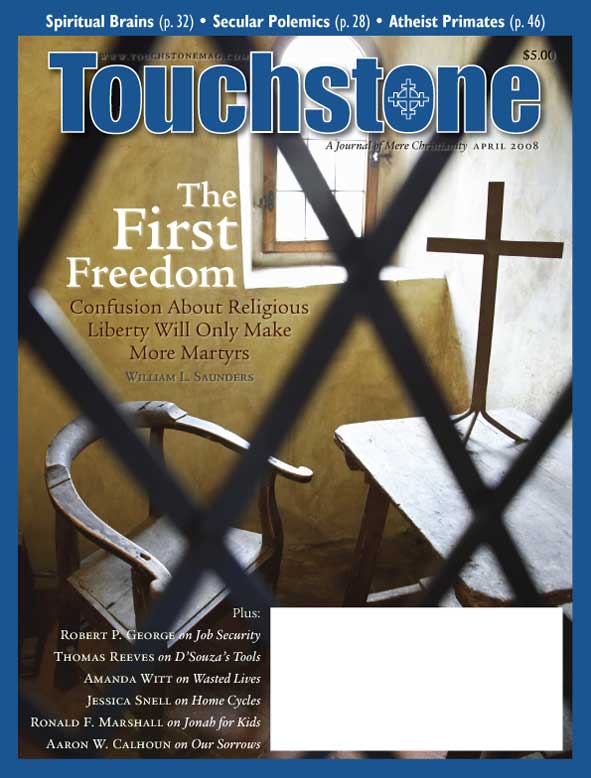That All May Be Saved
Why We Still Must Pray for the Jews
Several issues, like the reform of Social Security, have been called “the third rail of American politics,” because touching one of them can kill a politician’s career. The evangelization of the Jews is the third rail of interfaith relations, for obvious reasons, many of which are the fault of Christians. It can kill a promising dialogue and expose any Christian who proposes it to scorn and contempt.
The most recent controversy on the matter came with Pope Benedict’s retention in the Tridentine Mass of a revised version of a prayer “For the conversion of the Jews,” said on Good Friday.
The old version read: “Let us pray also for the Jews, that the Lord our God may take the veil from their hearts and that they also may acknowledge our Lord Jesus Christ. Let us pray: Almighty and everlasting God, You do not refuse Your mercy even to the Jews; hear the prayers which we offer for the blindness of that people so that they may acknowledge the light of Your truth, which is Christ, and be delivered from their darkness.”
The new version reads: “Let us also pray for the Jews: that God our Lord might enlighten their hearts, so that they might know Jesus Christ as the Savior of all mankind: Almighty and eternal God, whose desire it is that all men might be saved and come to the knowledge of truth, grant in your mercy that as the fullness of mankind enters into your Church, all Israel may be saved, through Christ our Lord. Amen.”
A Troubling Prayer
The revision omits the references to “blindness” and “the veil” (the latter taken from St. Paul’s second letter to the Corinthians), but retains the hope that the Jews will come to know the Lord. And so, not surprisingly, Jewish leaders rejected even this mitigated version.
“We are deeply troubled and disappointed that the framework and intention to petition God for Jews to accept Jesus as Lord was kept intact,” declared Abraham Foxman, the director of the Anti-Defamation League. The revised prayer kept “the most troubling aspect for Jews, namely the desire to end the distinctive Jewish way of life.” He clearly expected, though he did not say so outright, the church to drop the prayer entirely.
He had responded last year to the news that the pope was granting wider permission to use the Tridentine rite, with the older version of the prayer, by declaring that the action “would now permit Catholics to utter such hurtful and insulting words by praying for Jews to be converted. This is a theological setback in the religious life of Catholics and a body blow to Catholic-Jewish relations. It is the wrong decision at the wrong time. It appears the Vatican has chosen to satisfy a right-wing faction in the Church that rejects change and reconciliation.”
At its international meeting in mid-February, the Rabbinical Assembly, an international group representing the world’s Conservative rabbis, declared that it was “dismayed and deeply disturbed” that Benedict had kept the prayer and that they would “seek clarification from the Vatican of the meaning and status of the new text for the Latin Mass which will be heard in Catholic Churches on Good Friday.” This has to be read, I think, as a more polite and tactful request than Foxman’s that the prayer not be prayed.
Others reacted more mildly, stressing the success of the Jewish-Catholic dialogue and playing down the effect of the prayer on that dialogue. “Relationships with the Catholic Church are really quite good,” said the Rabbinical Assembly’s executive vice president, who said of the prayer only that “it really turns back the clock a bit and reverts to some sense that the church is pulling back from the positions it took in Vatican II.”
Foxman and some other activists aside, the Jewish leaders’ response to the prayer was muted compared with the condemnation a few years ago of the Southern Baptists’ efforts to evangelize Jews. Those efforts showed “a spiritual narrowness that invites theological hatred” and were an attempt at the “spiritual annihilation” of the Jews. They were especially angered by the use of Jewish Christians to evangelize other Jews.
The response to the “Prayer for the Jews” has been less heated than that to the Southern Baptists’ plans for evangelism, but has still amounted to the demand that Christians do not do something natural and intrinsic to Christianity.
A Necessary Reminder
We would want gently to note that in demanding that Christians do not pray for the conversion of the Jews, the Jewish leaders are demanding the conversion of Christians—not to Judaism, of course, but to a different version of Christianity, one defined not by our Scriptures and tradition but by the desires of another faith. This is no less offensive to Christians than the prayer is to Jews. It is an assault on the integrity of the Christian religion.
Whatever his view of other faiths, the Christian by definition believes that it is better to know, love, and follow Jesus in this world than not to, and that this is true for every single person on earth. This is, indeed, the basis not only for evangelization but for all preaching, all pastoral work, all spiritual direction, because while St. Paul tells us that the veil has been removed from those who are in Christ, he also reminds us that we see through a glass darkly. We only ask for our Jewish friends what we ask, in a different sense, for ourselves.
If it is true that it is better to know, love, and follow Jesus in this world than not to, we cannot but hope that every single person on earth will come to know, love, and follow Jesus, and what Christians hope for they must pray for. What we want for ourselves—an ever-clearer vision of the Savior—we want for everyone else.
And if we are, as Pope Pius XI famously said, “spiritual Semites,” and if the Jews are, as Pope John Paul II said, our elder brothers in the faith, we will naturally pray for them in particular. We can fully understand a Jewish man or woman feeling, “With friends like these . . .”, but for us such hopes and prayers are natural, indeed inevitable, indeed necessary, expressions of our faith.
One could argue that Christians should not pray that particular prayer on that particular day, as a charitable accommodation to Jewish feelings, but even if so, it is a prayer Christians should pray in some form on some days, and should sometimes pray together in worship. We cannot help but pray the words Foxman believes “hurtful and insulting,” because we believe that they are exactly the opposite.
— David Mills
For the Jewish scholar Jacob Neusner’s thoughts on the Good Friday prayer, see the “Interfaith News” section of the News department.
David Mills has been editor of Touchstone and executive editor of First Things.
subscription options
Order
Print/Online Subscription

Get six issues (one year) of Touchstone PLUS full online access including pdf downloads for only $39.95. That's only $3.34 per month!
Order
Online Only
Subscription

Get a one-year full-access subscription to the Touchstone online archives for only $19.95. That's only $1.66 per month!
bulk subscriptions
Order Touchstone subscriptions in bulk and save $10 per sub! Each subscription includes 6 issues of Touchstone plus full online access to touchstonemag.com—including archives, videos, and pdf downloads of recent issues for only $29.95 each! Great for churches or study groups.
Transactions will be processed on a secure server.
more from the online archives
calling all readers
Please Donate
"There are magazines worth reading but few worth saving . . . Touchstone is just such a magazine."
—Alice von Hildebrand
"Here we do not concede one square millimeter of territory to falsehood, folly, contemporary sentimentality, or fashion. We speak the truth, and let God be our judge. . . . Touchstone is the one committedly Christian conservative journal."
—Anthony Esolen, Touchstone senior editor









